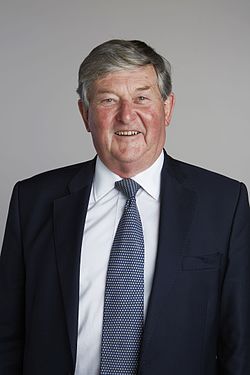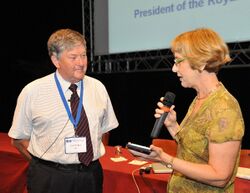Biography:David Phillips (chemist)
David Phillips | |
|---|---|
 David Phillips in 2015, portrait via the Royal Society | |
| Born | 3 December 1939[1] |
| Alma mater | University of Birmingham |
| Awards |
|
| Scientific career | |
| Institutions | University of Southampton |
David Phillips, CBE, FRSC, FRS (born 3 December 1939)[1] is a British chemist specialising in photochemistry and lasers, and was president of the Royal Society of Chemistry from 2010 to 2012.[3]
Education and early life
Phillips was born 3 December 1939 in Kendal, lived in South Shields and attended the Grammar School.[3][1] He studied at the University of Birmingham attaining a BSc and PhD.[1]
Career and research
Phillips began his career doing postdoctoral research at the University of Texas at Austin and the Academy of Sciences of the USSR.[3][4] He was appointed a lecturer in chemistry at the University of Southampton, rising to the status of Reader then becoming Wolfson Professor of Natural Philosophy, at the Royal Institution. In 1981, Phillips became a founding member of the World Cultural Council.[5] In 1989 he moved to Imperial College, London as professor of physical chemistry and held a number of senior posts there.[3]
In 1987 he gave the Royal Institution Christmas Lectures on television. He was appointed Officer of the Order of the British Empire (OBE) in 1999[3][1] and Commander of the Order of the British Empire (CBE) in the 2012 New Year Honours for services to chemistry.[6] In May 2011 he was the guest on Desert Island Discs[4] and in June 2012 was Michael Berkeley's guest on Private Passions.[citation needed]
Views on nuclear power
Ahead of the 50th anniversary of the 1962 James Bond film Dr No, Phillips stated that the character of Dr No, with his personal nuclear reactor, helped to create a "remorselessly grim" reputation for atomic energy.[7] and that the popularity of the movie created an enduringly negative image of nuclear power – as something dangerous that could be wielded by megalomaniacs with aspirations to world domination. Phillips claims that when nuclear power is discussed "it is not at all surprising that the public at home and abroad are sceptical" and concludes that "The Royal Society of Chemistry asserts that nuclear power has to be part of the future national energy mix, in which it plays a major role. Fossil fuels have to be eradicated for people to live in a healthy environment. Let's say yes to nuclear and no to Dr No's nonsense."
Awards and honours
Phillips received the Porter Medal in 2010 [8] and was elected a Fellow of the Royal Society (FRS) in 2015.[9]
References
- ↑ 1.0 1.1 1.2 1.3 1.4 ",". Who's Who. 2016 (online Oxford University Press ed.). A & C Black, an imprint of Bloomsbury Publishing plc. https://www.ukwhoswho.com/view/article/oupww/whoswho/U30743. (subscription or UK public library membership required)
- ↑ "David Phillips". Desert Island Discs. 1 May 2011. BBC Radio 4. Retrieved 2014-01-18.
- ↑ 3.0 3.1 3.2 3.3 3.4 www.rsc.org RSC President
- ↑ 4.0 4.1 Desert Island Discs Professor David Phillips
- ↑ "About Us". World Cultural Council. http://www.consejoculturalmundial.org/about-us/.
- ↑ No. 60009. 31 December 2011. p. 8. https://www.thegazette.co.uk/London/issue/60009/supplement/8
- ↑ Coughlan, Sean (12 January 2012). "James Bond villains blamed for nuclear's bad image". BBC News. https://www.bbc.co.uk/news/education-16509668.
- ↑ "Emeritus Professor David Phillips OBE awarded the Porter Medal | Imperial News | Imperial College London". 30 April 2010. https://www.imperial.ac.uk/news/88924/emeritus-professor-david-phillips-obe-awarded/.
- ↑ "Professor David Phillips CBE FRS". London: Royal Society. https://royalsociety.org/people/david-phillips-12094/.
pt:David Chilton Phillips
 |



